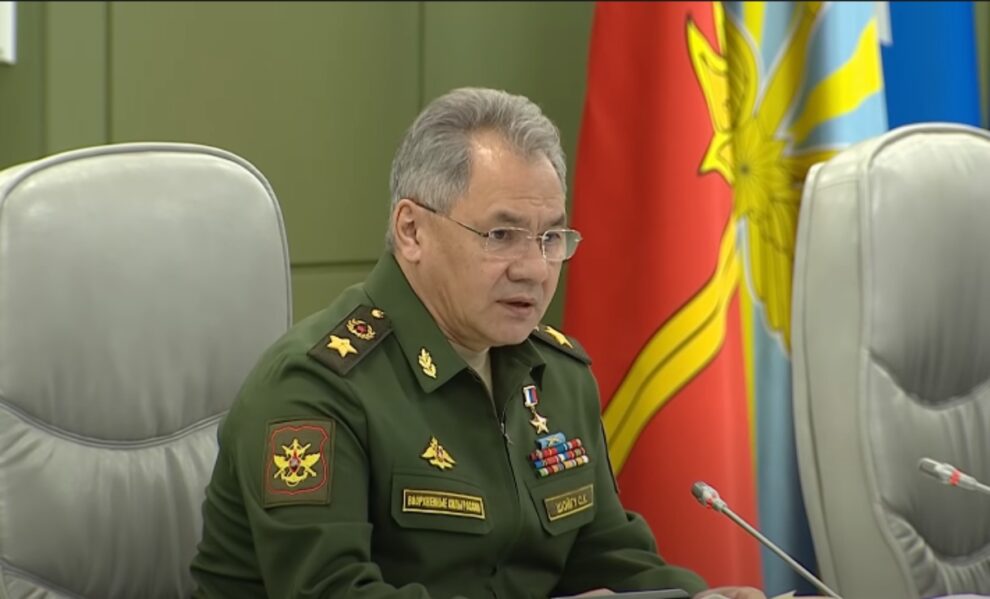Russia’s defence minister held rare telephone talks with his US counterpart Friday after Kremlin proxy officials said they were turning Ukraine’s southern city of Kherson into a “fortress” as Kyiv’s forces advance.
Details of the conversation — including its duration — between Russia’s Sergei Shoigu and US Defense Secretary Lloyd Austin were scant from official read outs but both sides said the senior officials had discussed Ukraine.
“Topical issues of international security — including the situation in Ukraine — were discussed,” Moscow said, with Washington saying: “Secretary Austin emphasized the importance of maintaining lines of communication amid the ongoing war against Ukraine”.
It was only the second call between the ministers since Moscow invaded Ukraine on February 24 and during the first — in May — Austin had urged Moscow to implement an “immediate ceasefire” in Ukraine.
At the time, Russia’s invading force had been beaten back from the capital Kyiv but were making steady gains in the eastern Donbas and Kharkiv regions and had solidified a hold in the south.
Six months on however Ukraine’s forces are pushing back — particularly in the south.
Kyiv’s forces in recent weeks — aided by Western weapons — have been advancing along the west bank of the Dnieper river towards the region’s main city, also called Kherson.
Kherson was the first major city to fall to Moscow’s troops after the invasion began and retaking it would be a crucial prize in Ukraine’s counter-offensive.
Kyiv said Friday it had retaken a total of 88 towns and villages in the region since launching its offensive to retake Kherson in the late summer.
On Friday, Moscow-installed authorities there accused Kyiv’s forces of carrying out a fatal attack on a bridge being used by civilians.
“Four people were killed,” pro-Moscow official Kirill Stremousov said on Telegram. “The city of Kherson, like a fortress, is preparing for its defence.”
Russian investigators said later two of the dead were journalists and 13 people had been injured.
A Ukrainian military spokeswoman Nataliya Gumenyuk earlier denied Kyiv’s forces were responsible, saying they do not target local populations.
Russian state-run media in recent days aired footage showing civilians with bags taking ferries across the river from Kherson.
Risks of disasters
Kyiv has branded the organised movement of Kherson residents to Russia and other Moscow-controlled regions as “deportations” of Ukrainian citizens.
Zelensky said late Thursday that Russian forces had mined the Kakhovka hydroelectric power plant with the intent of blowing it up.
Hundreds of thousands of people around the lower Dnieper river would be in danger of flash flooding if the dam was destroyed, Zelensky warned in a speech Thursday to European leaders.
On Friday, Prime Minister Denys Shmygal called for an international monitoring mission to deploy at the dam.
“International specialists need to arrive immediately at the station along with Ukrainian personnel,” Shmygal said during a government meeting.
He also said cutting water supplies to the south could also impact the cooling systems of the Zaporizhzhia nuclear power plant, Europe’s largest.
The nuclear facility is a key concern of Russia’s eight-month invasion with both sides regularly accusing the other of shelling near it and endangering operations.
Ukraine’s push in the south comes after a sweeping counter-offensive in the northeast Kharkiv region that has badly impaired Russia’s supply routes and logistics corridors in the eastern Donbas region.
But Russian forces have continued shelling the region’s largest city, Kharkiv, and the presidency said Friday “industrial infrastructure” was hit in the city, wounding six.
The attack is the latest in a weeks-long barrage that has targeted infrastructure and particularly energy facilities.
Energy-saving measures were put in place across Ukraine after Russian missile and drone strikes destroyed what Zelensky said was more than 30 percent of the country’s power stations in a week.
‘We can hold out’
A 64-year-old Ukrainian, Vyacheslav, told AFP in Kyiv the nation would make do, despite the restrictions.
“There are books to read. There are battery-powered lights. I think we can hold out for a few hours. There are gas stoves so it will still be possible to cook,” he said, declining to give his full name.
Kyrylo, a 27-year-old shop salesman, said there had been a rush on power banks after Russian attacks began on the energy facilities in the capital.
“We don’t sell flashlights but regarding power banks, I can say that on the 10th, when the attack on Kyiv began, almost all available power banks were sold, and in general, the demand for power banks increased by 70 or 80 percent,” he added.
The Ukraine presidency said Friday Russian forces were shelling sections along the entire front line of Donbas and that two were killed in the Donetsk region.
